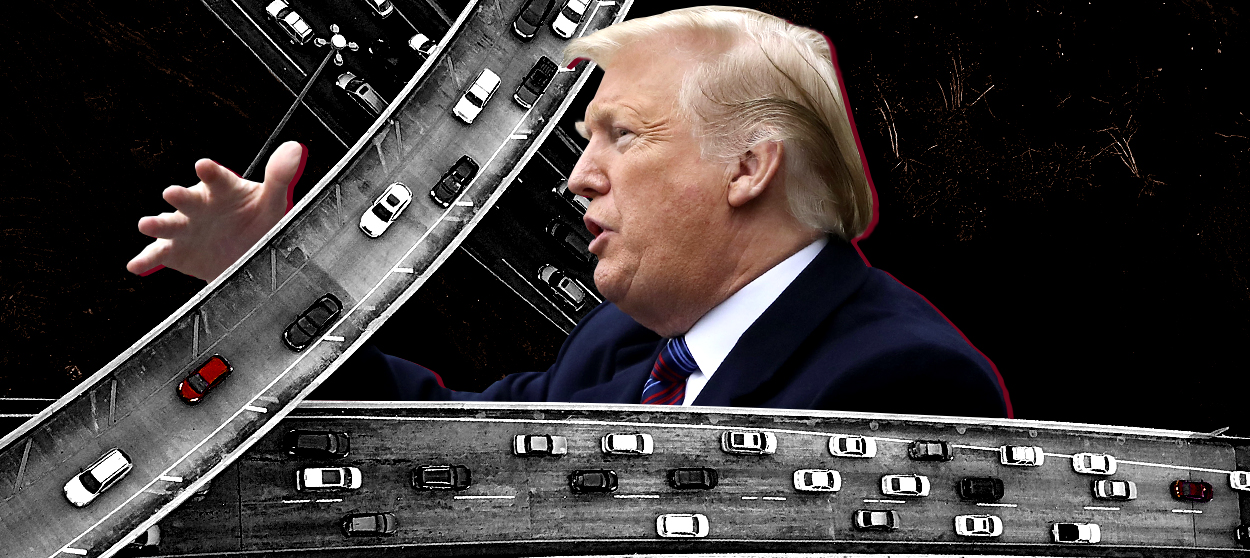Trump's remarkable swerve on infrastructure
Here's why you didn't hear Trump mention public-private partnerships last night


A free daily email with the biggest news stories of the day – and the best features from TheWeek.com
You are now subscribed
Your newsletter sign-up was successful
In his State of the Union address last night, President Trump once again called on Congress to help him pass a big infrastructure bill.
He's mentioned the subject a number of times before. "Infrastructure week" became a running joke in 2018. Yet, a major push to repair and update the nation's roads, bridges, seaports, airports, telecommunications, and utilities has only ever been a talking point for the White House.
A big part of the problem is that the Trump administration actually did release an infrastructure proposal, and it's garbage. Even Trump himself seems to agree with that assessment.
The Week
Escape your echo chamber. Get the facts behind the news, plus analysis from multiple perspectives.

Sign up for The Week's Free Newsletters
From our morning news briefing to a weekly Good News Newsletter, get the best of The Week delivered directly to your inbox.
From our morning news briefing to a weekly Good News Newsletter, get the best of The Week delivered directly to your inbox.
He didn't say so in the State of the Union, of course. Trump's speech last night included a vague acknowledgement that "Congress is eager to pass an infrastructure bill" and "both parties should be able to unite" on the issue. But according to The Wall Street Journal, when White House officials saw drafts of the speech with yet another call for Congress to pass Trump's infrastructure proposal, they tried to nix the subject.
Why the behind-the scenes-drama? "Mr. Trump doesn't actually want Congress to pass the only infrastructure proposal his administration has produced," the Journal wrote. "Mr. Trump has continued to tell aides and officials that he 'hates' central elements of [the plan]."
That plan would've dangled about $200 billion in federal spending in front of states and private businesses to entice them to contribute another $1.3 trillion. The federal funding would have gone towards incentives and sweeteners to encourage state governments to invest themselves, and into tax incentives for private firms to partner with local governments on projects.
Two of the Journal's sources said it was these public-private partnerships specifically that drew a lot of Trump's ire. In fact, earlier this month, the White House held a meeting of high-level officials to try to resuscitate the infrastructure agenda. Nothing much came of it. It's not clear if the administration wants to release its retooled plan or wait for the Democrats, who now control the House, to put forward their own agenda. But Trump still seems attached to the $1 trillion figure, and, according to CNBC, he thinks public-private partnerships are "ineffective." Last week Axios reported that "public-private partnerships are effectively off the table."
A free daily email with the biggest news stories of the day – and the best features from TheWeek.com
This is actually pretty remarkable.
It's not news that Trump doesn't really care about orthodox Republican ideology. His party is deeply hostile to things like direct public investment, big ticket spending programs, or federal borrowing. Yet Trump doesn't seem to object to them. Up until now, it looked like Trump didn't care about Republican ideology because he didn't care about ideology, period. He just knew infrastructure polled well and would be happy to hawk whatever plan the GOP gave him. But it turns out Trump does have some policy ideas of his own. And he's willing to antagonize his own party to stick by them.
Moreover, Trump's right: Public-private partnerships are bad. They're biased towards projects where the population has enough income to pay the new tolls and fees so the private business can recoup its investment. But it's members of poorer communities, who can't afford those costs, who usually need infrastructure repair the most.
Also praiseworthy is the president's apparent disinterest in finding a funding mechanism for any new plan. Borrowing to invest in long-term productivity enhancements is more or less the definition of responsible use of debt. Despite the low unemployment rate, inflation and interest rates and wages remain lackluster, suggesting the economy is still below capacity. One trillion dollars in new deficit spending would do some good.
None of this is to suggest Trump has suddenly become a closet progressive. But an infrastructure plan that relies on deficit spending and direct public works seems to be the position Trump is working towards. And the only way he could possibly get it is by working with Democrats in the House. (And browbeating a few Senate Republicans.)
Whether the Democrats will work with Trump is another matter. Any win for the president on infrastructure would only strengthen his hand politically, emboldening him to pursue policies Democrats find more objectionable. Democrats might balk.
But who knows? Maybe infrastructure week will happen yet.
Jeff Spross was the economics and business correspondent at TheWeek.com. He was previously a reporter at ThinkProgress.
-
 How the FCC’s ‘equal time’ rule works
How the FCC’s ‘equal time’ rule worksIn the Spotlight The law is at the heart of the Colbert-CBS conflict
-
 What is the endgame in the DHS shutdown?
What is the endgame in the DHS shutdown?Today’s Big Question Democrats want to rein in ICE’s immigration crackdown
-
 ‘Poor time management isn’t just an inconvenience’
‘Poor time management isn’t just an inconvenience’Instant Opinion Opinion, comment and editorials of the day
